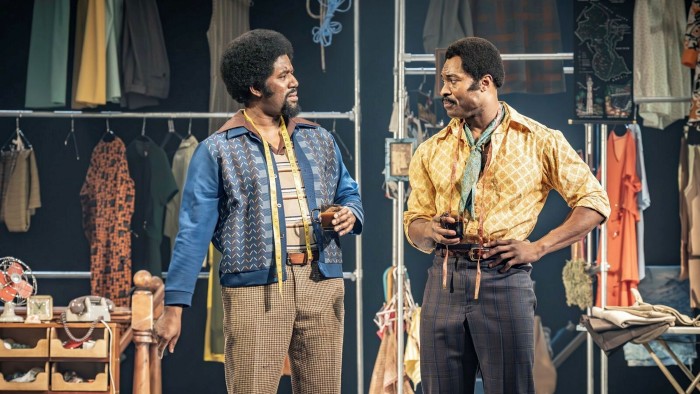Summarize this content to 2000 words in 6 paragraphs in Arabic Unlock the Editor’s Digest for freeRoula Khalaf, Editor of the FT, selects her favourite stories in this weekly newsletter.Walker Holt is good at alterations. A hem taken up here; a seam nipped in there: he’s stitched together a living using needle and thread. But to reach his heart’s desire — a smart tailor’s shop of his own — he’s going to have to make some much more fundamental alterations. And while he’s grinding out the back-breaking 24-hour commission that will help him clinch his dream, his personal life is coming apart. It’s good to see Michael Abbensetts’ 1978 play on the National Theatre stage. Though lacking the depth and intricacy to make it a truly great play, given a few tucks itself by playwright Trish Cooke, it’s a lively comedy about Black British life that springs into life in Lynette Linton’s warm, exuberant production. And Walker is Guyanese: beneath the comic surface lie spiky details about the immigrant experience in 1970s Britain and the cost of “making it” in a frequently hostile world.We join Walker, his colleague Buster, and their young van driver, Courtney, as they take on a mountain of tedious work, fixing hundreds of pairs of drab trousers. Walker, driven by the tantalising prospect of the pay cheque that will transform his life, goes at it like a man possessed. Buster is mainly focused on getting the job done and visiting his wife in the maternity hospital; Courtney (Raphael Famotibe), just 19, sees a dead-end future for his generation; the more flamboyant Horace (Karl Collins) has designs on Walker’s neglected wife, Darlene. Their contrasting hopes and concerns create a kaleidoscopic view of life in 1970s London. And, as she did previously with Lynn Nottage’s Sweat and Clyde’s, Linton adroitly intersperses the frazzled realism of the workplace with more poetic, surreal interludes that express the way individuals are caught up in systems beyond their control. Frankie Bradshaw’s design fills the central platform of the stage with the bustling chaos of a cramped workshop. But around this busy hubbub is a liminal space through which stroll Walker’s smartly dressed Guyanese parents and a youth attired in a tracksuit. It makes the point that Walker is caught between two worlds, breaking for a future that may not be there, dreaming of making suits for a generation that will opt for mass-produced leisurewear. Arinzé Kene expresses this tension brilliantly: his Walker, wound tighter than any reel of thread, seems permanently about to burst with hope, anxiety and fatigue. Gershwyn Eustache Jnr brings a lovely phlegmatic quality to the gentler Buster, his concern for his wife contrasting starkly with Walker’s ruthless ambition. There’s a quietly rueful performance too from Colin Mace, as the older Jewish tailor who gives Walker the commission, recognising the younger man’s drive, while Cherrelle Skeete’s Darlene conveys the exasperation of an intelligent woman whose own dreams have been clipped.It’s not a perfect play by any means — there are too many important threads left dangling and one plotline in particular is conducted with the sort of slapdash speed that would see it instantly rejected if it were a garment in Walker’s shop. But, like a beloved vintage outfit, it is restored with care and affection here.★★★★☆To April 5, nationaltheatre.org.uk
رائح الآن
rewrite this title in Arabic Alterations, National Theatre review — an exuberant 1970s comedy of Black British life
مال واعمال
مواضيع رائجة
النشرة البريدية
اشترك للحصول على اخر الأخبار لحظة بلحظة الى بريدك الإلكتروني.
© 2026 جلوب تايم لاين. جميع الحقوق محفوظة.










